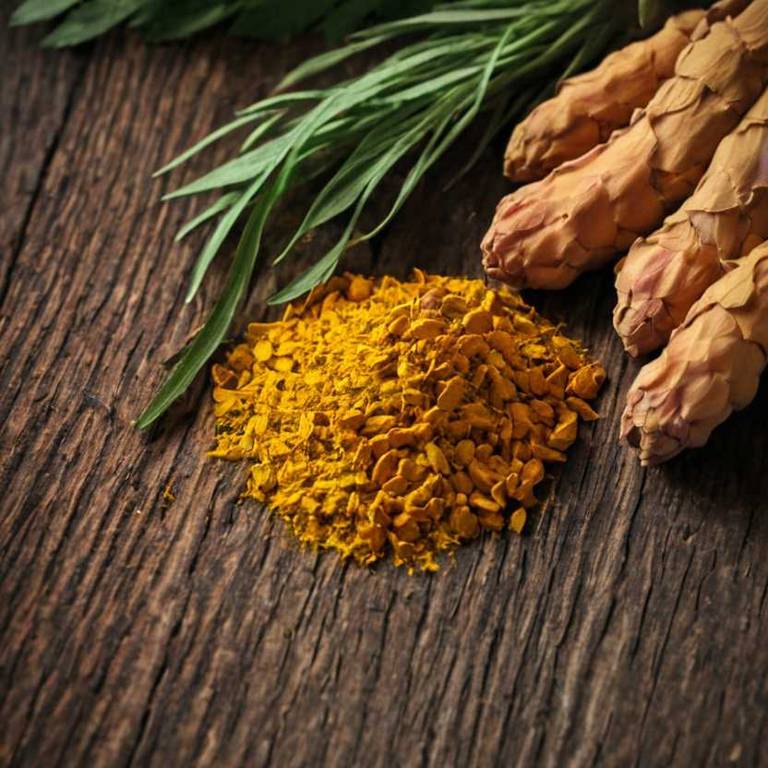Turmeric (Curcuma longa)
Turmeric (Curcuma longa) is a member of the Zingiberaceae family, native to Southeast Asia, India, and Indonesia. Traditionally, its rhizomes, leaves, and flowers have been used for powders, decoctions, and infusions.
This herb is particularly valued for its anti-inflammatory, tonic, and carminative actions, and has a long history of use in ayurvedic medicine, traditional chinese medicine, and japanese kampo medicine.

Quick Facts / Key Information
| Common Name | Turmeric |
|---|---|
| Scientific Name | Curcuma longa |
| Plant Family | Zingiberaceae |
| Genus | Curcuma |
| Species | longa |
| Native Range | Southeast Asia, India, Indonesia |
| Plant Parts Used | Rhizomes, Leaves, Flowers |
| Primary Medicinal Actions | Anti-Inflammatory, Tonic, Carminative |
| Primary Traditional Systems | Ayurvedic Medicine, Traditional Chinese Medicine, Japanese Kampo Medicine |
| Historical Preparation Methods | Powder, Decoction, Infusion |
Botanical Identity
- Scientific Name
- Curcuma longa
- Common Name
- Turmeric
- Synonyms / Alternative Names
- Yellow Root, Indian Saffron, Yellow Root
- Plant Family
- Zingiberaceae
- Genus
- Curcuma
Botanical Description
- Growth Habit
- Perennial herbaceous plant.
- Height
- It typically grows to a height of 20 to 50 centimeters.
- Leaves
- Broad leaves with upper surface ranging from pale yellow to greenish-yellow and lower surface pale white to pale yellow, featuring prominent stomatal bands.
- Stems
- Erect growth habit with alternate branching, smooth surface, and rhizomatous structure.
Traditional Uses / Historical Use
Traditional Systems
- Ayurvedic Medicine
- Traditional Chinese Medicine
- Japanese Kampo Medicine
Historical Preparation Methods
- Powder
- Decoction
- Infusion
- Culinary Use
Medicinal Actions
- Anti-inflammatory
- Traditionally described as a mild anti-inflammatory, in topical or internal use contexts.
- Tonic
- Historically regarded as a warming tonic, for long-term use contexts.
- Carminative
- In herbal texts, considered a moderate carminative, for digestive process support.
- Antispasmodic
- In herbal literature, noted as a calming antispasmodic, for tension-related applications.
Active Compounds
- Terpenoid
- Plant-produced compounds commonly found in essential oils and resins.
- Phenolic Acid
- Organic acids commonly occurring as part of plant secondary metabolism.
- Essential Oil
- A mixture of naturally occurring compounds responsible for plant aroma.
- Flavonoid
- A widely occurring class of plant polyphenols found in leaves, flowers, and fruits.
Modern Research Overview
This section is reserved for future summaries of scientific research related to this plant. As additional verified sources are reviewed, relevant study information will be added here.
Safety & Contraindications
- General Precautions
- Caution is advised in certain contexts based on traditional use and available information.
- Contraindications
- Contraindications related to this herb have been noted in traditional use and available sources.
- Allergies
- Allergic reactions associated with this herb have not been well documented.
- Drug Interactions
- Interactions with prescription medications have not been well documented.
- Toxicity
- Reports of toxicity related to this herb are not well documented in available literature.
- Pregnancy & Breastfeeding
- Safety during pregnancy and breastfeeding has not been well documented.
Preparation & Usage Methods
- Infusion
- Dried or fresh plant parts are infused in hot water and consumed as a beverage.
- Decoction
- Plant material is simmered in water to extract compounds from tougher parts.
- Poultice
- A topical preparation made by applying softened plant material externally.
- Powder
- Plant parts are dried and mechanically reduced to a powdered form.
- Culinary Use
- A preparation involving the use of plant parts in cooking or food production.
Growing, Harvesting & Storage
Growing / Cultivation
- Soil
- Prefers loamy soil with well-drained conditions. Typically grows best in organically rich soils.
- Sunlight
- Thrives in partial sun. Tolerates full sun to partial shade.
- Watering
- Prefers well-balanced moisture levels. Tolerates periodic dry conditions.
Medical Disclaimer
The information provided on this page is for educational and informational purposes only. It is not intended to diagnose, treat, cure, or prevent any medical condition. Always consult a qualified healthcare professional before using any herb for medicinal purposes.